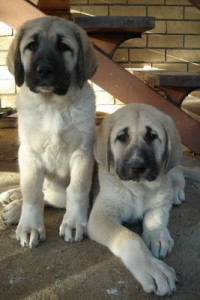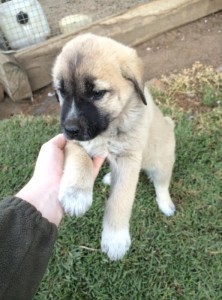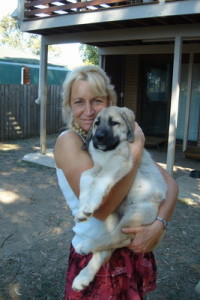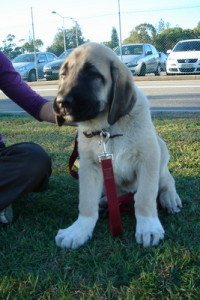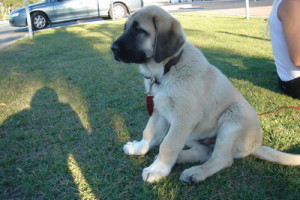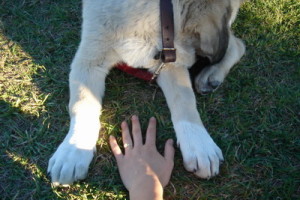What makes a good breeder? Does it matter if someone is a registered breeder or not? Does it matter if they do shows or not? Do papers matter or not? What is a backyard breeder? Aren’t crossbreeds stronger and healthier than purebreds? Can you be scammed/ripped off? What should you look for in a breeder and what should you ask them?
Registered or not Registered?
A registered breeder is bound by the rules of the Kennel Club of his State or the Registry to which he belongs – some are rules and some are principles.
For instance a registered breeder in Australia MUST register every single live puppy and issue papers to the new owners in the new owners name (unless there is a signed agreement for co-ownership or leasing). If you purchase a puppy from a registered breeder and they refuse to give you the ownership papers or even register the pup, you can approach your State Kennel Club who will either force the breeder to provide the paperwork or de-register the breeder.
This is not just a rule of the Kennel Clubs but comes under the jurisdiction of Australian Consumer Law. If you purchase an item it becomes yours and must be transferred to you legally. Your state Office of Fair Trading and your State Kennel Club will follow this up for you if you have problems.
A registered breeder must not sell a pup before 8 weeks of age, it must be vaccinated and it must be microchipped. If the bitch has had more than 4 litters or is over a certain age, a Registered Breeder must provide a Vet Health Check before the bitch is bred.
A registered breeder should be concerned for the puppy’s welfare for the rest of its life and work with the owners through health issues, temperament problems and help with rehoming even late in life. A registered breeder cares about where his lines end up and how they are bred.
An unregistered breeder can breed any two dogs together with no proof of the dogs’ relationship (so mother to son, etc) and with no care of their health problems (breeding over and over dogs with major health or temperament issues), with no care who they sell to, with no further interest in the pup once the money changes hands and with no recourse for the buyer.
Do Registration Papers Matter?
Yes. Here’s a few of my reasons.
A dog with a pedigree has a Dollar Value for his entire life. Fact: There are no purebred dogs cooling their heels in any of the shelters around Australia. Why? Because purebreds are snapped up long before funny looking crossbreeds. Check your local shelter website and you will most likely see that they say they do not keep waiting lists for purebreeds. However, when one comes in, they are generally placed for up to 3 times the price you can recieve your crossbreed for. By selling my pups with papers linked to their microchip, if I lose track of the owners or circumstances change and the dog is parted from his family, I have given him the best possible chance of a long life in another home simply because he has real Dollar Value in the eyes of the general public. That alone for me is good reason to always breed with papers.
Without papers the lines eventually die out and vanish. There have been a number of excellent imports into Australia but those that weren’t registered, even though they may have been bred from, have simply vanished. Even if any of these dogs are still alive they cannot be used to help the Australian bloodlines and will simply be an interesting blip in our history but of absolutely no benefit to anyone.
Without papers, there is no possible way to know how the dogs are related. We can have such huge variations in type within one litter that it would be easy to breed brother and sister, mother to son, etc.
Without papers, breeds simply vanish from history.
Does showing matter?
It’s true that you can campaign a relatively poor quality dog and if you keep trying for long enough you will eventually gain a title that means very little in this case – not all Judges are brave enough to refuse to award a dog they feel does not meet the standard. However, plenty of Judges are brave and won’t award an inferior dog, or a dog that does not meet the standard, for instance is missing it’s tail.
Naturally a true Livestock Guardian Anatolian is not bred to strut around a ring. However, to breed a dog that conforms to the standard and can be shown means that you have a dog with excellent conformation – who is therefore strong, muscular, athletic and physically capable of carrying out the job he was bred for. Showing does not tell us if his temperament is correct for the job but it does tell us and teach us a lot about how well conformed the dog is to perform that job. It therefore assists a breeder to breed stronger and healthier dogs.
It’s then a personal matter for the breeder to also breed for temperament as there is no show that can help us with that!
The ultimate dog is beautifully conformed to win in a show ring but of correct temperament to work in the field.
That is the ideal that most registered breeders would be hoping to obtain.
Generally speaking showing teaches us to look at our dogs objectively, to learn about correct conformation and keep learning about conformation and also exposes you to the expertise of many dog knowledgeable people – which is often invaluable. Unless you line your dog up against other dogs, how will you ever know how he really stacks up? Who will make the best mate for him? Should he be bred at all? And so on. It also demonstrates a great passion and love for your chosen breed.
An unregistered breeder is hoping to make some money to pay their car repayments and cares not at all if the dogs are sound, healthy, correct size, of working ability or if you are a good home.
Does Showing a Dog mean that it must have Incorrect Temperament (ie too soft)?
Some factions claim that the dogs are too tough, too dangerous, too proud, too aloof, too untrainable, etc., to be show dogs and the mere fact that they are in the showring means that they have incorrect temperament for the breed. I personally disagree with this.
My take is that you might have a great working dog temperament but you can desensitise him to things so that he tolerates them. Also no matter how independant he is, he has to kowtow to at least one human – his owner or he’ll be dangerous.
So if he say needs stitching up – I should have sufficient control over him so he stays still while someone stitches him or vaccinates him, etc.
With showing, I take mine to dog obedience because I want them to tolerate other dogs in controlled situations (that won’t stop them attacking a sheep killing dog in their own paddock so doesn’t interfere with their working style) and to cope with crowds in controlled situations.
The dog classes I use, the head trainer knows I want to show my dogs so when we do stand stays, he strolls over and does what the judge does and if the dog moves or growls I tell him off. So in other words, if I’m there, I make the decisions as to what my dog has to tolerate and if I’m not there he can eat the judge. It’s not much that they have to get used to actually. They have to stand in line with other dogs who are under control and in between wait quietly with me ringside – not really hard for a naturally aloof calm fearlesss breed. They have to tolerate the judge looking at his teeth and running his hands along his body and pushing on his hips – a lot less than me asking them to be still while a vet stitches up a wound. Other than that only I touch my dog at a show.
They are smart. It’s not hard to teach them to behave in a certain way just in this environment.
You can make a hard edge dog desensitised to the simple goings on at a show. Google Lucky Hit Anatolians in the USA – he has super sharp working dogs but they still win in the show ring.
It’s just training.
If I give permission for someone to touch my dog then if he doesn’t tolerate it, that shows he’s out of control and I’ve done a bad job raising him. I’m not asking him to tolerate being abused or to put up with me being beaten up in front of him or anything dramatic. I’m just asking him to pose and let someone check him out. To me it’s no big deal that he allows it and I should have that level of control over him.
Also if you see the judge is very tactile in how he touches the dogs before you, you simply have to tell him as he approaches that it’s a working dog and can I show him the teeth instead of the judge? No judge wants to get bitten and most appreciate even more if the dog is showing correct working temperament so will be OK. If he’s not, you can choose to leave the ring and all you lose is your $10 entry and half a day!
What is a backyard breeder?
A misnomer in my opinion. The majority of Registered Breeders love their dogs, only keep the best ones who are their personal pets and therefore breed them in their backyard or right inside their house actually. The puppies are handled from birth and exposed to all members of the family and visitors. They care about making sure every puppy personality is the best possible for every potential owner.
A breeder with many many dogs can’t possibly provide the same individual attention to their dogs but they are in the position to make potentially better breeding choices simply because of sheer numbers. They are more likely to make breeding decisions based on facts than emotion – someone like myself is likely to suffer from what we call “kennel blindness”!
Large numbers of dogs owned by one person also does not necessarily mean poor care. Often the dogs in well run commercial kennels are better cared for than many pet dogs that languish in tiny backyards their entire life.
Both sorts of Registered Breeders are very important to all breeds – in my opinion.
A personal anecdote: My parents purchased for me my first puppy in 1979, a rough coated Collie. We spent the day driving around Brisbane answering all the adverts in the weekend paper for what was then a very popular breed. All were “backyard breeders” though all were also Registered Breeders and sadly most were in filthy conditions with haggard bitches, dirty puppies, etc. However, the very last house was in a rough part of south Brisbane but all completely different. We were invited inside to a small but immaculate house and all the puppies rushed to greet us – 9 weeks old, huge, clean, friendly and healthy with a happy healthy bitch following in their wake. They only had one girl dog as a pet but for the sire they had chosen and paid for a fully imported UK Stud dog. We chose my pup handed over $130 since he was the biggest pup, exchanged details for the pedigree and was then told that he would be fine in the car as they had taken all the pups for little drives around the area to make sure none would get car sick on their trip to their new homes!! How good was that?
If anyone knows a Mr and Mrs Marshall who bred a collie litter in Beenleigh in 1979, I’d love to let them know that at least one of their pups had a glorious long healthy life and lived till he was 16 years old.
A backyard breeder? Yes. Bad? No.
Are crossbreeds healthier than purebreeds?
No. Simple genetics. All dogs have the potential to carry genes for displasias, cancer, epilepsy, etc. Breeders of purebred dogs have all the records on hand of previous generations and receive feedback from their buyers so they can be aware to a larger degree of any potential problems in their pups. A person who crosses two cute dogs together and gives them a snazzy name like schnoodle or doodle or whatever does no health checks and cares not one iota about what came before or what they produce.
A prime example are the Labradoodle breeders who claim their dogs are non shedding and therefore good for humans with allergies. The labrador retriever is one of the most highly allergenic breeds of dogs – what a great starting breed to create non-allergic model!
The ‘labradoodle’ “breed” began in Australia. The person who came up with the idea, has long since regretted that it ever happened.
One website with the story:
http://www.globalanimal.org/2010/12/02/man-who-created-labradoodles-regrets-the-cross-breed/
Another sad fact with genetics. If you cross say a Bull Mastiff with a Great Dane, the DNA won’t do a quick work around and take the most desirable qualities of both dogs to create a 36 inch tall Bull Mastiff with a laid back Dane nature and a perfect bite (level teeth). If that was the case, we humans would all be stunningly beautiful and highly intelligent too. Instead you could end up with a Bullmastiff head on a Dane’s long legs or a long Dane head on a stumpy bull mastiff body or a really bad attitude on long legs or a Dane head with an incredibly severe Mastiff underbite – nasty.
So no, cross breeds aren’t healthier or stronger than purebreeds.
Cross breeds are, however, a potential way to make money – no up front cost of obtaining top quality breeding stock, no costs in exhibiting, no costs for health testing (hip xrays, thyroid testing, eye tests, etc), no breeder registration costs, no costs for pedigrees, often no vaccinating or microchipping costs, no on going puppy buyer support, no limits of 4 litters per bitch (breed them till they drop), and absolutely no liability.
What Should I Look for in a Breeder?
How interested is the breeder in your family, house, lifestyle etc? Do they grill you like a super spy? Good, that means they care where their puppy will live.
Does the breeder show a good knowledge of the breed? Are they able to explain the breed standard and the faults and good qualities of their dogs? Are they able to provide training tips? Do they provide healthcare advice and diet advice?
Will they let you come to their kennels to see the conditions the dogs are kept in?
Do their dogs look healthy, happy and well fed? Are they friendly once you’re allowed in or fearful?
Are the puppies clean and active and the correct weight and size for their age? Do you agree with the breeder’s feeding regime?
Can they explain their breeding choices to you or do they simply just breed the same pair of dogs over and over?
How many champions have they produced so far? Are the dogs they are using to breed Champions? If not, why not? If their dogs are not titled and if none of their previous puppies are titled then it would be highly unlikely that they will ever produce good stock because they are not starting with good stock. Not exactly rocket science.
Are they actually registered breeders or breeding on some dodgy scheme where some other breeder, sometimes in another state, provides papers? On this subject it must be noted that it is quite normal for breeders to sell their pups with some agreement/contract either written or verbal that the new owners stay in contact and that if the dog grows up to be of exceptional quality, the breeder is allowed to use the dog in part of his future breeding scheme. This allows a breeder to make the best possible choices for his future breeding plans. It’s quite impossible to keep all the potentially good puppies at home and grow them out till they are 2 years old before making a decision as to which ones to use. Also for the dog, he or she probably has a much nicer life being the centre of a family’s life than one of many in a breeding kennel. If the dog is one day used as part of the breeder’s breeding plans, this would be under the breeder’s prefix with the breeder being responsible for finding good homes for the offspring and taking full responsibility for the health and welfare of the pups. This is an excellent way to produce better and better dogs over time – it gives the breeder a far wider selection of breeding options.
However, sometimes you will find breeders of any breed of dog who are not registered themselves but who can offer papers provided by a third party who is a registered breeder. This is in general nothing to do with improving bloodlines by choosing the best possible dogs for breeding but usually it’s the same pair of dogs being bred over and over regardless of proven health or temperament problems with cash to the person breeding the dogs and kickbacks to the person providing the papers. If you have problems with these pups you cannot hope for any help whatsoever from these “breeders”.
It’s up to you, the buyer, to decide to give large sums of money to people involved in these sort of schemes.
Before you hand over money, make sure you get it in writing/email that the parents are registered and your puppy will be registered. Believe me, you’re going to need this later!
If it is possible to do, always try to see the dogs in the flesh and familiarise yourself with the Breed Standard to make sure the parents match up to it. If the parents don’t meet the standard, your pup will not meet the standard. Simple as that.
Are the papers that you receive actually in your name? (If not, contact your local Kennel Club and make the breeder change them over correctly). How do you know that the dogs presented to you as the parents are the dogs on the pedigrees? Is the breeder transparent?
Are they passionate about their breed?
How long have they owned their current dogs? Do they just move dogs around, trade them back and forth?
Beware of breeders who tell you this page of mine is full of points that just don’t matter. My decades of experience with this breed and knowledge of the lines in Australia allows me to have these views. Sue me.
Please think very carefully about who you will buy your dog from. This breed can live well into their teens – make sure you get a dog you will be proud to own for a great chunk of your life.
Does it matter how long the breeder has been involved with breed?
Yes it does. It’s why I do not knowingly sell pups to people who’ve never owned the breed before but want to breed.
If you have never owned the breed before, how will you know if your dog is good enough to breed? How will you provide support to your puppy buyers if you’ve only owned the breed yourself for a year or so? How will you know who to breed to? How will you gauge temperament? How will you know about health issues?
The best first time breeder will be one who originally owned the dog or dogs as pets, has learned a lot about them over the years, has made themselves familiar with the bloodlines available in Australia and THEN decides to launch into breeding. Knowledgable and responsible.
There are currently people in breeding (unregistered or under a scam – see below) who have never looked at any other dogs than their own. Even though in Sydney, Brisbane and Melbourne, you can visit one of the established kennels and see many dogs or attend a show and see a few, some of these so called breeders have never bothered – they know it all as some sort of birthright. They have no idea of the standard or what the dog is supposed to look like or what the temperament is supposed to be like.
Scams and Scammers
The Fair Trading laws in most states of Australia require a seller to correctly transfer ownership to a purchaser unless there is some sort of co-ownership agreement in place.
I have lost count now of the unhappy pupper buyers who have contacted me over the years who have purchased from so-called Registered Breeders (or breeding under a scheme where some unseen third party provides the papers) and are told that yes you can breed the dog (and make thousands of course) but when the buyer tries to do that, he discovers one or a combination of the following:
- The papers are not in his name but the breeder’s name, nor is the back signed for transfer. He does not own his own dog.
- The papers are Limited Register in the Breeder’s name so even in you manage to transfer them, Limited Register means you cannot show or breed.
- The papers just never came as in fact the litter was never registered – either because the bitch is bred back to back over and over and only 4 litters in her life can be registered or the breeder never registered the litter and has quite simply scammed you.
You have two avenues open to you in this instance and I advise doing both:
- Contact the Kennel Club in your state (such as DogsNSW, DogsVic or DogsQld) and present them with all the information, proof of purchase, details of the breeder and any substantiating emails wherein the breeder admits he is selling you a dog (a Registered Breeder can NEVER sell an unregistered dog or breed a litter and not register them – he will be struck off is he is reported). The Kennel Club will honour the breeder’s promise and provide you with papers and they will generally de-register the breeder.
- Contact the equivalent of Office of Fair Trading in your state and file a complaint against the breeder. This probably won’t get you your papers but you will have the satisfaction of having him fined and possibly getting all or part of your money back.
You can also contact me and I will HAPPILY help you!!
Another scam is telling you how big the dog is – they’ll swear black and blue the dog is 70, 80, 90 kgs when most of the above scammers have dogs that would have to be severely overweight to tip 40 kgs. They’ll tell you the dog is 36 inches tall when in fact they are the same size as a Labrador. If you choose to believe any of us as to the sizes of the dogs without either LOTS of photos with humans in them for comparison or without going to see the dogs yourself with your proverbial measuring tape in hand, then you deserve to be ripped off. Buyer beware.
Will your pup purchased from a good passionate Registered Breeder be perfect/flawless?
Sadly no!! In spite of our best efforts to choose the best parents available to all of us individually, not all pups turn out perfect. There are faults in all lines of dogs of all breeds and our breed is most certainly not immune to such problems.
In our breed, we are starting with animals that have sometimes been bred purely for purpose (working) with scant regard to conformation or faults. Many of the dogs we see in photos in Turkey would not impress anyone in the showring but they do their job in their land of origin. Things that we might see as faults and flaws (double dew claws, entropian, straight stifles, flat feet, etc) are ignored in their homeland if the dog’s useful qualities outweigh his faults.
In fact the things we see as faults that simply don’t matter in Turkey is a debate in itself!
Additionally, many faults are not present in a puppy when it leaves the breeder and will not manifest sometimes for a year or more. A good registered breeder is realistic about this and disappointing though it is for all parties, it is unfortunately life!
Even in humans, if two brilliant doctors marry and have 10 children, there is no guarantee that all the children will turn out brilliant, healthy and doctors. Out of 10 kids, one will be a drug addict in jail! That’s life too!
I myself am unfortunately starting to find that I’m getting faults that I thought would only happen to OTHER people! Annoying.
However, a good dog breeder will help you and try to work through all issues with you. Sometimes there is no perfect solution but usually the dog can continue to be a wonderful pet which is generally all that you bought the dog for in the first place.
So there are no guarantees that I or any other registered breeder will sell you a prize winning flawless puppy. However, what we do do, is choose the best parents we have available with the least faults that we know of and then give those puppies the best possible care we can before they leave us. After that it’s largely up to how you care for your dog and little bit of sheer genetic luck!
What can you do to not get ripped off?
Do lots and lots of research. Read the Breed Standard so you know what the parents should look like. Insist on seeing the parents. Generally speaking a puppy at 8 weeks will be from 10 to 16 kgs in my experience. The 16 kg pup may not end up as big as the 10 kg pup – we’ve learned that too along the way but they will all either meet or exceed the minimum for the Standard. I know of Gumtree style breeders (registered or not) whose pups are 6-8 kgs at 8 weeks. These pups will end up the size of a Labrador. Buy them if you want.
Your pups should be showing signs at 8 weeks of the great size to come – big knuckles, good heads.
Below please find a photo of two of my pups at not quite 8 weeks of age (Luchs x Yahsi litter) and one pup advertised as being 9 weeks of age on Gumtree. Study the photos. Look at the size of bone of the pups and quality of the head. The Gumtree pup was in all fairness selling for less than 20% of what I sell my pups for. You are getting about 20% of the dog too. You also don’t get to see the parents and know nothing of their breeding but from my own experience I know that these dogs will either be Brother x Sister or something equally as close – no papers and who cares or knows? Your choice. Educate yourself.
Just to be fair and give a human size perspective – the female pup at 8 weeks with me – Izzy again. She weighed 14 kgs. The Gumtree pup above might weigh 6 kgs. The Gumtree pup’s foreleg fits on a human hand, whereas Izzy’s foreleg is as long as my forearm.
I had better add that I don’t claim to have the biggest dogs in Australia – I’d like to be able to claim that but sadly I can’t! But I’ve always done a huge amount of research and travelling before I buy my pups and have been fortunate to have always dealt with equally passionate people who have been kind enough to entrust me with good dogs.
When Yahsi came to me at 9 weeks of age, he was 16 kgs. Here he is on the grass at Coolangatta aiport – just arrived! I personally would be very happy if all my pups were of this calibre.
Why Buy a Purebred Dog?
The most impressive answer to this question is found here on the Dogzonline website under exactly that heading:
https://www.dogzonline.com.au/pedigree_dogs.asp
Have read through that and decide for yourself.
